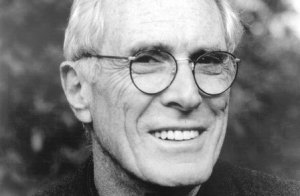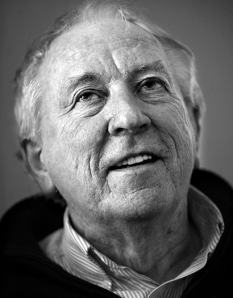American poet Will Schutt holds this year's Reginald S. Tickner Writing Fellowship at GIlman. In honor of National Poetry Month, Schutt shares a few favorites.
With poetry month upon us, I thought I would share a few contemporary poems I like with the Gilman community. The poems that capture my attention most wave hello and goodbye at the same time. In Mark Strand’s “Always”, a few frumpy gods – “the great forgetters” – sit around a table, willing the world away. First houses go, then bridges, then cities and states, then countries and continents. The poem has an enchanting, allegorical quality about it, yet it remains grounded in the actual world of barges and bays. It reminds me of the early days of spring, when we bid farewell to the grim light of a long winter and greet the blank slate of the future – “the blaze of promise everywhere.”
Always
—Mark Strand
[caption id="attachment_363" align="alignright" width="300"] Mark Strand[/caption]
Mark Strand[/caption]
for Charles Simic??
Always so late in the day
In their rumpled clothes, sitting
Around a table lit by a single bulb,
The great forgetters were hard at work.
They tilted their heads to one side, closing their eyes.
Then a house disappeared, and a man in his yard
With all his flowers in a row.
The great forgetters wrinkled their brows.
Then Florida went and San Francisco
Where tugs and barges leave
Small gleaming scars across the Bay.
One of the great forgetters struck a match.
Gone were the harps of beaded lights
That vault the rivers of New York.
Another filled his glass
And that was it for crowds at evening
Under sulphur yellow streetlamps coming on.
And afterward Bulgaria was gone, and then Japan.
“Where will it stop?” one of them said.
“Such difficult work, pursuing the fate
Of everything known,” said another.
“Down to the last stone,” said a third,
“And only the cold zero of perfection
Left for the imagination.” And gone
Were North and South America,
And gone as well the moon.
Another yawned, another gazed at the window:
No grass, no trees…
The blaze of promise everywhere.
[caption id="attachment_366" align="alignright" width="199"] Tomas Transtromer[/caption]
Tomas Transtromer[/caption]
Like Strand, the Swedish Nobel laureate Tomas Tranströmer is a poet of artful simplicity whose work is attracted to suggestion and silence. His poems come as close to music as possible, which is to say, to unparaphrasability. It is hard to talk about Tranströmer without reverting to words like luminosity, dream, miracle. Yet what saves his poems from becoming a bit of woozy fluff is their clarity of expression. The Italian writer Italo Calvino talks about imagination as being like jelly. Just as jelly has no shape until you spread it on a piece of toast, the imagination has no shape until you spread it over a hard surface. In “The Half-Finished Heaven” below, the hard surfaces are the steady, declarative sentences (noun + predicate; noun + predicate; noun + predicate). In the end, this airy poem becomes earthbound, tugged downward, toward the lake, into the center of the earth, its flight broken.
The Half-Finished Heaven
— Tomas Tranströmer (translated by Robin Fulton)
Despondency breaks off its course.
Anguish breaks off its course.
The vulture breaks off its flight.
The eager light streams out,
even the ghosts take a draft.
And our paintings see daylight,
our red beasts of the ice-age studios.
Everything begins to look around.
We walk in the sun in hundreds.
Each man is a half-open door
leading to a room for everyone.
The endless ground under us.
The water is shining among the trees.
The lake is a window into the earth.
[caption id="attachment_365" align="alignright" width="300"] James Tate[/caption]
James Tate[/caption]
James Tate may be our country’s best rebel poet. Like any comedian worth his salt, Tate makes light of our collective madness—especially our madness for order. In his prose poem “The Rules,” he shows us the folly of conformity and the absurd extent to which the Jacks of this world will try to keep us from experiencing anything. Sorry, teachers, this one’s for the boys.
Jack told me to never reveal my true identity. “I would ?never do that,” I said. “Always wear at least a partial disguise,”?he said. “Of course,” I said. “And try to blend in with the? crowd,” he said. “Naturally,” I said. “And never fall in love,”?he said. “Far too dangerous,” I said. “Never raise your voice,”?he said, “Understood,” I said. “Never run,” he said. “I ?wouldn’t dream of it,” I said. “Never make a glutton of yourself,”? he said. “It won’t happen,” I said. “Always be polite,” he? said. “That’s me, polite,” I said. “Don’t sing in public,”?he said. “You have my promise,” I said. “Don’t touch strangers,”?he said. “That’s forbidden,” I said. “Never speed,” he said.?“You can count on me,” I said. “Don’t wear plaid,” he said.?“No plaid,” I said. “Don’t pet dogs,” he said. “Of course? not,” I said. “Don’t jump fences,” he said. “I won’t,” I? said. “Stay away from children,” he said. “I will,” I said.?“Don’t enter churches,” he said. “Of course not,” I said.?“Good posture at all times,” he said. “Good posture is a must,”? I said. “Never pick money out of the gutter,” he said. “That’s? not for me,” I said. “Be punctual,” he said. “Always on time,”? I said. “When walking or driving always mix your routes,” he? said. “Naturally,” I said. “Never order the same meal twice,”?he said. “Never,” I said. “Do not be seen on the street after ?midnight,” he said. “Not ever,” I said. “Do not give money ?to homeless beggars,” he said. “Nothing for the beggars,”? I said. “Do not start conversations with officers of the law,”?he said. “No talking with cops,” I said. “No ice skating,”?he said. “Never,” I said. “No skiing,” he said. “Of course? not,” I said. “When a sign says STAY OFF THE GRASS, you’ll? stay off,” he said. “I will, I said. “No chewing gum in? public,” he said. “I won’t,” I said. “You must carry your weapon? at all times,” he said. “Always armed,” I said. “You must? follow orders,” he said. “Count on it,” I said. “You will? contact Central once a week,” he said. “Contact Central,”? I said. “No green pants,” he said. “Certainly not,” I said. “No orange or purple shirts,” he said. “Not for me,” I said. “No sushi,” he said. “Oh no,” I said. “No fandango,” he said.?“Not possible,” I said. “No farm bureau,” he said. “Not my? style,” I said. “Beware hypnotism,” he said. “Always? alert,” I said. “Watch out for leeches,” he said. “A danger? not forgotten,” I said. “Stay off gondolas.” “Instinctively,” ?I said. “Never trust a fortune-teller,” he said. “Never,”?I said. “Avoid crusades,” he said. “Certainly,” I said.?“Never ride on a blimp,” he said. “Blimps are out,” I said. ?“Do not chase turkeys,” he said. “I will not,” I said. “Do? not put your hand in the mouth of a horse,” he said. “Out? of the question,” I said. “Never believe in miracles,” he said. “I won’t,” I said.
